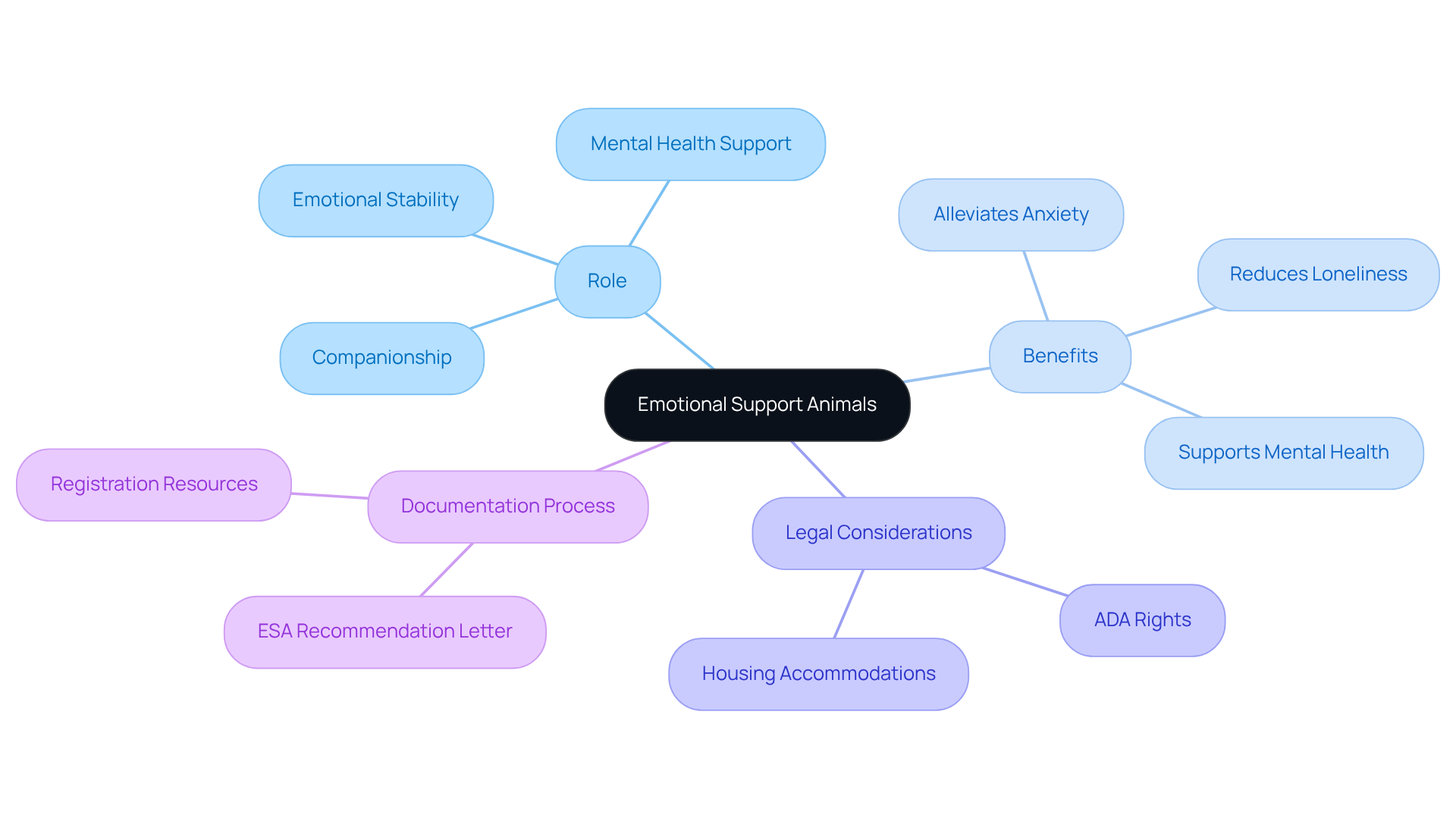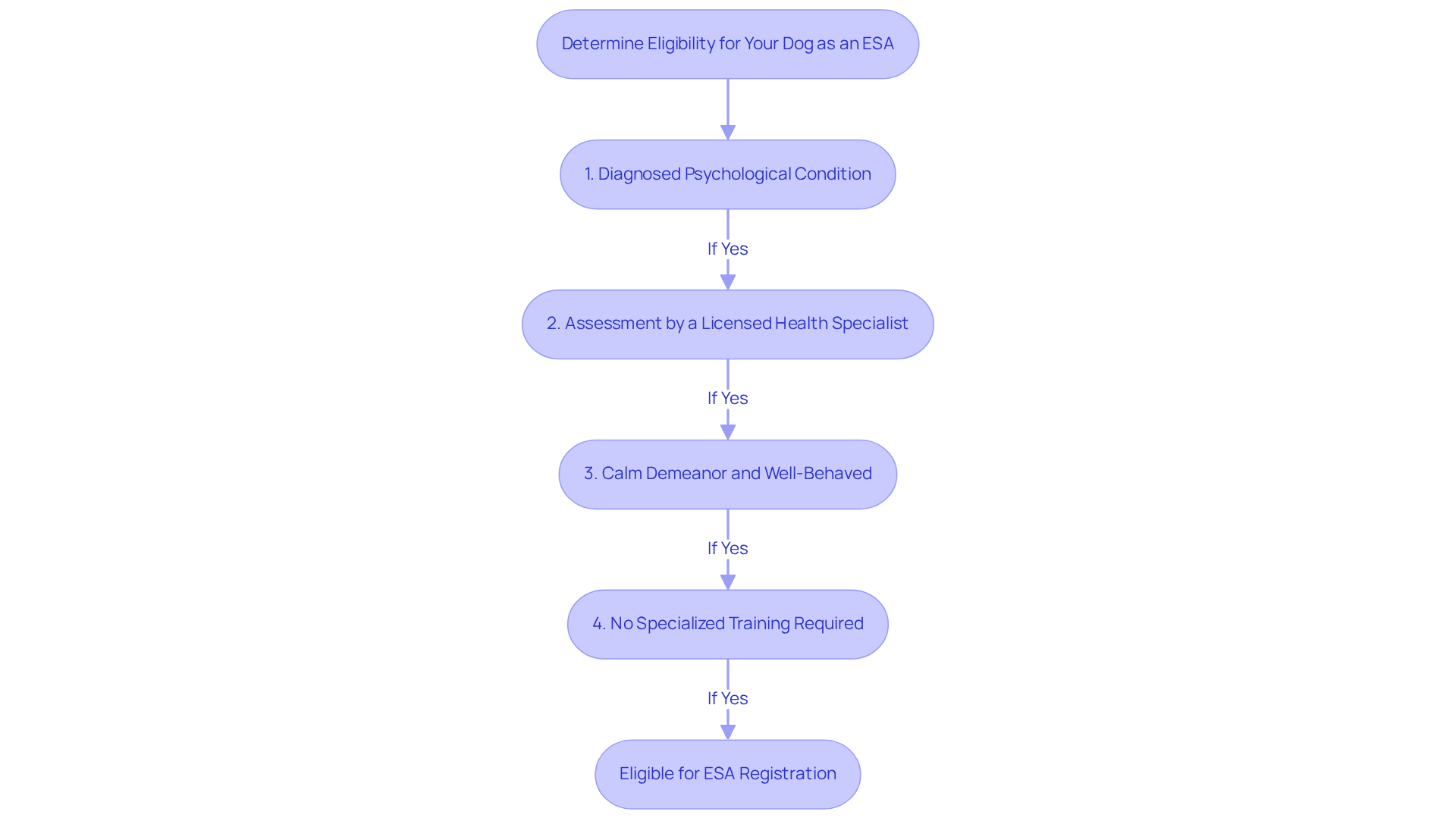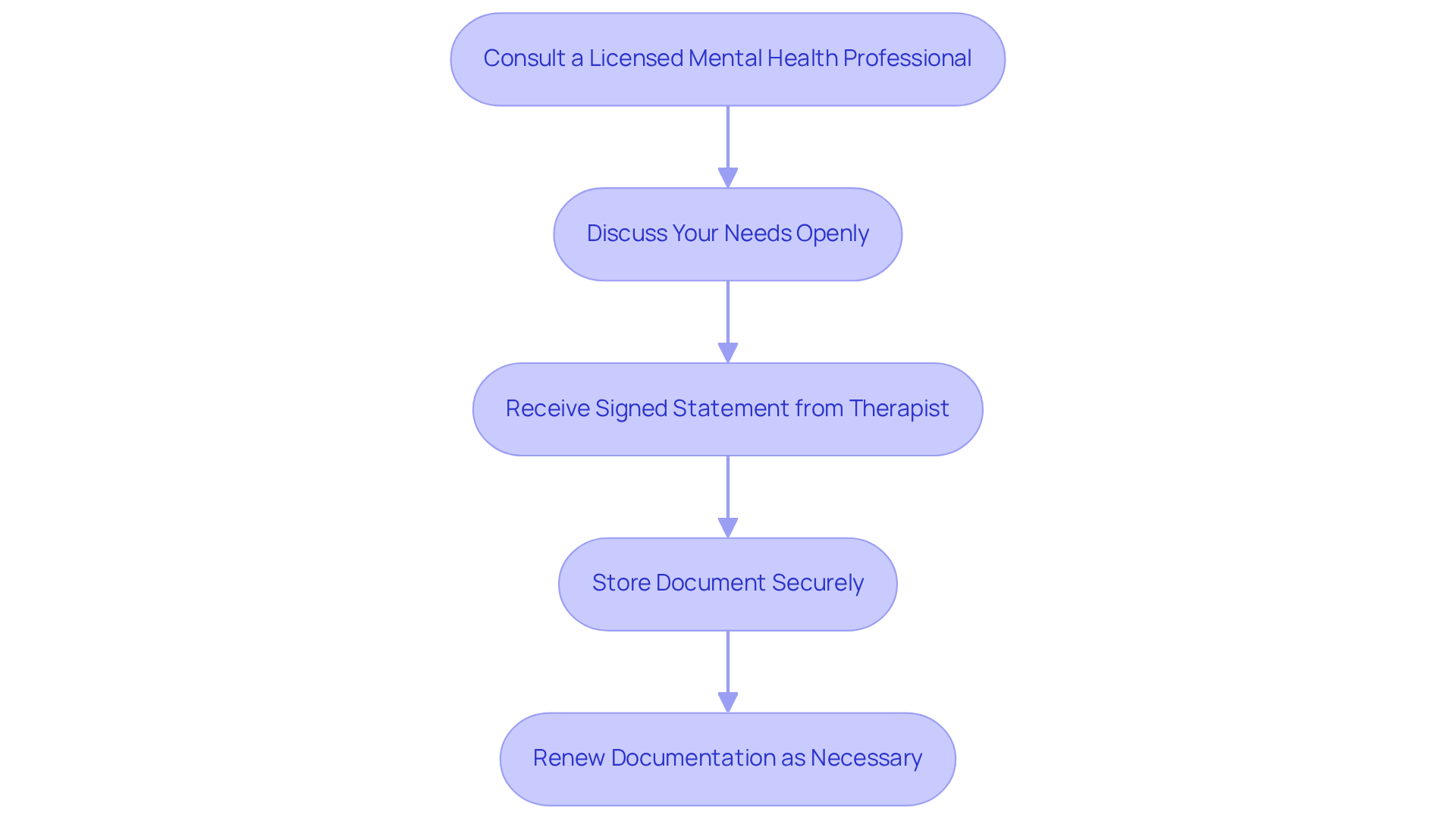

Register Your Dog as an Emotional Support Animal in Australia
by Lena Park
Last updated: September 15, 2025
Verified and Approved by:
Angela Morris,
MSW, LCSW
Fact Checked

Overview
Registering your dog as an Emotional Support Animal (ESA) in Australia can be a vital step towards enhancing your emotional well-being. If you are navigating the challenges of a diagnosed psychological condition, it’s important to know that you are not alone. Obtaining a signed recommendation from a licensed mental health professional is essential in this process.
This article outlines the necessary steps, emphasizing the importance of:
- Ensuring your dog is well-behaved
- Understanding your rights regarding housing and travel
Proper documentation and support can significantly ease your journey, reminding you that there is help available to support you through these emotional challenges.
Introduction
Emotional Support Animals (ESAs) are more than just pets; they serve as vital companions that provide comfort and stability to those navigating emotional and psychological challenges. For many individuals, these cherished animals offer invaluable support in times of need.
However, the process of registering a dog as an ESA in Australia can often feel overwhelming and is frequently misunderstood. What steps must one take to ensure their beloved furry friend qualifies for this important designation? How can understanding the legal landscape enhance the benefits of having an ESA?
By exploring these questions, we can illuminate the path to securing the emotional support that many individuals so desperately seek, fostering a sense of hope and connection.
Understand Emotional Support Animals and Their Role
Emotional Support Animals (ESAs) serve as loving companions for individuals navigating emotional or psychological challenges. Unlike service animals, which are specifically trained to assist those with disabilities, ESAs primarily offer companionship and emotional stability. They can significantly alleviate feelings of anxiety, depression, and loneliness, proving invaluable for those coping with mental health issues.
It’s essential to understand that ESAs do not possess the same legal rights and access to public spaces as service dogs under the ADA. Recognizing the role of emotional support animals and the importance of having the appropriate documentation to register a dog as an emotional support animal in Australia is a vital step in appreciating their potential benefits in various settings, such as housing and travel.
At Wellness Wag, we are committed to empowering individuals through accessible Emotional Support Animal letters. We ensure you have the necessary resources and guidance to navigate this process with confidence. Our mission is to dismantle barriers and provide the support you need to experience the transformative power of ESA companionship.
How might your life change with the comforting presence of an ESA by your side?

Determine Eligibility for Your Dog as an ESA
Determining if your dog qualifies as an Emotional Support Animal (ESA) involves considering a few important criteria that can make a meaningful difference in your life.
-
It’s essential to have a diagnosed psychological health condition, such as anxiety, depression, or PTSD. Many people face these challenges, and research shows that approximately 62% of ESA owners experience significant reductions in stress and anxiety levels. This highlights the therapeutic benefits that the companionship of an animal can provide.
-
A licensed health specialist needs to assess your condition and recommend an ESA as part of your treatment plan. This professional recommendation is crucial, as it not only validates your need for emotional support but also aligns with legal requirements.
-
Your dog should display a calm demeanor and be well-behaved in different environments. A well-socialized dog enhances its ability to provide emotional support, making it more effective in alleviating symptoms of mental health conditions.
-
Unlike service dogs, ESAs do not require specialized training. However, it’s beneficial for them to be comfortable in public settings and able to interact positively with others.
By ensuring your dog meets these criteria, you can confidently take the next steps to register your dog as an emotional support animal in Australia and obtain the necessary ESA document. This document is essential for accessing housing and travel accommodations under the Fair Housing Act and Air Carrier Access Act, providing you with the support you deserve.

Follow the Steps to Obtain an ESA Letter
Obtaining an ESA letter for your beloved dog can be a meaningful step towards enhancing your emotional well-being. Here’s a compassionate guide to help you through the process:
-
First, consider consulting a licensed mental health professional. Scheduling an appointment with a qualified therapist or psychiatrist can provide you with the support you need to assess your mental health condition.
-
During your consultation, take a moment to discuss your needs openly. It’s important to articulate how your dog alleviates your symptoms and the specific benefits you hope to gain from having an emotional support animal. This dialogue is crucial in helping the professional understand your unique situation.
-
If the therapist determines that an ESA is suitable for your treatment, they will issue a signed statement confirming your need for the emotional support animal. This document should include your diagnosis, the professional’s contact information, and their license number, ensuring that you have the necessary support.
-
Remember to keep this important document accessible. Store it securely, and maintain copies for landlords or airlines whenever needed. Having these documents ready can ease any potential stress in the future.
-
Lastly, be mindful of the need to renew your ESA documentation as necessary. Some landlords or airlines may request updated documents yearly, so maintaining consistent communication with your healthcare provider for renewals is essential.
The average time to obtain an ESA document can vary, typically ranging from 24 hours to several weeks, depending on the provider’s availability and your current relationship with them.
This journey may feel overwhelming at times, but know that support is available to you. You are not alone in this, and taking these steps can lead to a more fulfilling and emotionally supportive life with your furry companion.

Troubleshoot Common Issues in the Registration Process
The process to register dog as emotional support animal Australia can be a journey filled with challenges. It’s important to know that you’re not alone, and there are ways to navigate these obstacles with care and support.
-
Finding a Qualified Professional: It can be tough to locate a licensed health expert who understands your needs. If you’re having difficulty, consider using online directories or reaching out to trusted friends and family for recommendations. Local organizations may also offer valuable guidance in connecting you with qualified professionals who can help.
-
Dealing with Document Rejections: If a landlord or airline rejects your ESA documentation, take a moment to ensure it meets all legal requirements. This includes verifying that it contains the professional’s contact information and license number. If necessary, don’t hesitate to ask your mental health professional for an updated document that aligns with the standards. Remember, landlords cannot deny ESAs based solely on registration or certification, as these are not legally mandated.
-
Understanding Your ESA Rights: It’s crucial to educate yourself about your rights concerning ESAs in housing and travel. Familiarizing yourself with the Fair Housing Act and the Air Carrier Access Act can empower you to advocate for your needs effectively. These laws protect your right to have an ESA, even in properties that typically prohibit pets, and understanding them can provide you with the confidence to stand up for yourself.
-
Addressing Behavioral Concerns: If your dog is exhibiting behavioral issues, consider enrolling them in training classes to improve their socialization and obedience. Not only does this enhance your dog’s ability to provide emotional support, but it also alleviates any concerns that landlords or travel authorities may have regarding your ESA’s behavior.
Many individuals have successfully navigated the process to register dog as emotional support animal Australia with Wellness Wag, finding that the approval for their ESA documents was straightforward and hassle-free. With a streamlined online procedure, Wellness Wag ensures you receive authentic ESA documents quickly, allowing you to focus on the invaluable support your pet provides. If you encounter challenges, remember that countless others have resolved issues with rejected ESA letters by following these compassionate guidelines.

Conclusion
Registering a dog as an Emotional Support Animal (ESA) in Australia is a crucial step for those navigating the emotional turbulence of challenging times. This process not only offers individuals the comforting presence of their pets but also equips them with essential documentation to support their needs in various settings, including housing and travel.
Many individuals face emotional challenges that can feel overwhelming. Having a diagnosed psychological condition and a recommendation from a licensed mental health professional are vital criteria for ESAs. These requirements can seem daunting, but they are designed to ensure that those who need support can access it. The journey to obtain an ESA letter involves practical steps, such as:
- Maintaining open communication with healthcare providers
- Understanding one’s legal rights regarding ESAs
What challenges have you encountered in this process? Remember, you are not alone, and there are solutions to help you navigate these hurdles effectively.
Ultimately, registering a dog as an emotional support animal transcends mere paperwork; it symbolizes a commitment to enhancing emotional well-being. By taking these important steps, individuals can cultivate a nurturing environment for themselves and their furry companions. Embracing the companionship of an ESA can lead to significant improvements in mental health. As you consider this journey, know that support is available, and advocating for your rights is a crucial part of this process. Together, we can foster a deeper understanding of the registration process and the profound impact that ESAs can have on our lives.
Frequently Asked Questions
What are Emotional Support Animals (ESAs)?
Emotional Support Animals (ESAs) are loving companions that help individuals dealing with emotional or psychological challenges. They primarily offer companionship and emotional stability rather than being specially trained to assist with disabilities like service animals.
How do ESAs help individuals?
ESAs can significantly alleviate feelings of anxiety, depression, and loneliness, providing invaluable support for those coping with mental health issues.
Do ESAs have the same legal rights as service animals?
No, ESAs do not have the same legal rights and access to public spaces as service animals under the Americans with Disabilities Act (ADA).
What is necessary to register a dog as an emotional support animal in Australia?
It is essential to have the appropriate documentation to register a dog as an emotional support animal, which helps in appreciating their potential benefits in various settings, such as housing and travel.
What services does Wellness Wag provide regarding Emotional Support Animals?
Wellness Wag offers accessible Emotional Support Animal letters and provides resources and guidance to help individuals navigate the process of obtaining an ESA with confidence.
Certify Your Emotional Support Animal Today

Why You Can Rely on Us?
At Wellness Wag, we believe your pet deserves care rooted in both science and compassion. Each article is carefully researched, written in clear language for pet owners, and then reviewed by qualified professionals to ensure the information is evidence-based, current, and practical for real-life care. Our goal is to help you feel confident in making informed decisions about your pet’s health and well-being.
Reviewed by
Angela Morris, MSW, LCSW
Angela is a licensed clinical social worker with 20 years of experience in patient advocacy and community mental health. She has assisted numerous clients with ESA evaluations and brings a deep understanding of disability accommodations, ensuring that all information is accurate, supportive, and practical.

Written by :
Lena Park
Last Updated :
September 15, 2025












